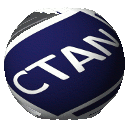Directory macros/latex/contrib/crefthe
crefthe — cross referencing with proper definite articles and declensions
"crefthe" is a LaTeX package aimed at helping \cref to handle the definite articles and declensions properly (especially for the phenomenon of article contractions in many European languages, such as French and German).
Motivation
By default, when using cleveref's \cref to reference theorem-like environments, the names do not contain definite articles. This may be acceptable for English, but certainly not good enough for languages such as French, Italian, Portuguese, Spanish, etc. — in these cases there shall be grammatical errors and would give you a strong feeling that it is machine-generated.
As an example, if we define the French names to be:
\crefname{theorem}{le théorème}{les théorèmes} \crefname{proposition}{la proposition}{les propositions}
Then when one writes (which means "We can deduce this from ..."):
On peut le déduire de \cref{thm1,thm2,prop3}.
the result would be:
On peut le déduire de les théorèmes 1 et 2 et la proposition 3.
which is wrong, as the correct result should be:
On peut le déduire des théorèmes 1 et 2 et de la proposition 3.
\cref would not be able to handle such cases correctly.
The solution
Thus, it would be better to have a new command \crefthe[<prep>]{<labels>}, and to use it like
\crefthe[de]{thm1,thm2,prop3}
in order to get "des théorèmes 1 et 2 et de la proposition 3".
Usage
Simply load the package with:
\usepackage{crefthe}
"crefthe" uses "cleveref" internally, thus it should usually be placed at the last of your preamble.
With the package optionoverwrite, you may simply use\creffor\crefthe, and similarly for other commands.
Before everything, you need to define the names, which can be done with \crefthename. Its syntax is similar to \crefname, but now you can specify the definite articles, for example (in French):
\crefthename{theorem}[le]{théorème}[les]{théorèmes}
Then you can use the command \crefthe as follows:
\crefthe[<prep>]{<labels>}- This will pass the preposition
<prep>to the definite articles that follows. Its behavior depends on the current language (for example, in Spanish,<prep>is passed only to the first definite article, while in French it is passed to everyone).
- This will pass the preposition
\crefthe-[<prep>]{<labels>}and\crefthe+[<prep>]{<labels>}- In case the automatic version does not meet your needs, here are two manual ones. The
-version passes the preposition<prep>only to the first definite article, while the+version passes<prep>to every definite article.
- In case the automatic version does not meet your needs, here are two manual ones. The
- There is also a stared version
\crefthe*for generating the same text but without hyperlinks.- The name-only relatives are also available:
\namecreftheand\namecrefsthe.\cpagereftheand\Cpagereftheare provided as well.
Regarding language with declensions
In German, there are four declensions: nominative (Nominativ), genitive (Genitiv), dative (Dativ) and accusative (Akkusativ). For such situation, we introduce the command \crefthevariantname to specify the referencing name for the correspond environment. Below is an example of usage:
\crefthevariantname{theorem} { {Satz}{Sätze} , Nominativ = [der]{Satz}[die]{Sätze} , Genitiv = [des]{Satzes}[der]{Sätze} , Dativ = [dem]{Satz}[den]{Sätzen} , Akkusativ = [den]{Satz}[die]{Sätze} }
The first line in the configuration is the default set of names when no variant is specified. It is recommended, though not required.
After this, you may refer to a theorem via
\crefthe[<prep>,variant=<declension>]{<label>}
You may also use the shortcuts (nom., gen., dat. and akk.), such as:
\crefthe[<prep>,Nom]{<label>} \crefthe[<prep>,Nom.]{<label>} \crefthe[<prep>,nom]{<label>} \crefthe[<prep>,nom.]{<label>}
These four are all equivalent and you may choose one to use according to your preference.
For more information, please refer to the documentation.
Acknowledgement
There are so many people I wish to express my gratitude to during the development of this package, including:
- Patrick Bideault, without whose advice and careful explanation, this package probably would never have been born. Merci!
- Enrico Gregorio, Phelype Oleinik and Joseph Wright (in alphabetical order). They made valuable suggestions in the early development of this package and even edited some of the code themselves.
- Jonathan P. Spratte, without whose help the German support would probably take much longer to complete.
License
This work is released under the LaTeX Project Public License, v1.3c or later.
Download the contents of this package in one zip archive (86.6k).
crefthe – Cross referencing with proper definite articles and declensions
By default, when using cleveref’s \cref to reference theorem-like environments, the names do not contain definite articles. In languages such as French, Italian, Portuguese, Spanish, etc. this results in incorrect grammar. For this purpose, the current package offers \crefthe, which handles the definite articles properly (especially for the article contractions in many European languages).
| Package | crefthe |
| Repository | https://github.com/Jinwen-XU/crefthe |
| Version | 2024-02-25 |
| Licenses | The LaTeX Project Public License 1.3c |
| Copyright | 2021–2024 Jinwen XU |
| Maintainer | Jinwen XU |
| Contained in | TeX Live as crefthe MiKTeX as crefthe |
| Topics | Label and References Experimental LaTeX3 |
